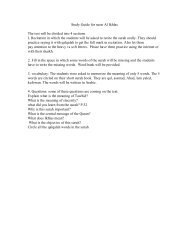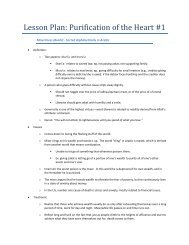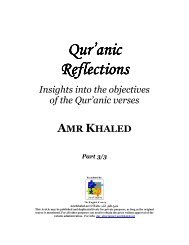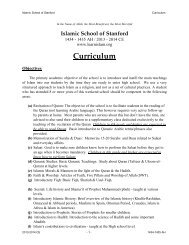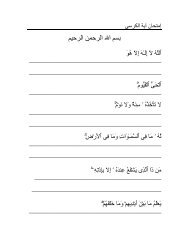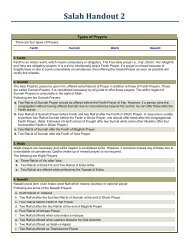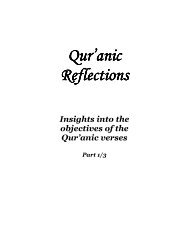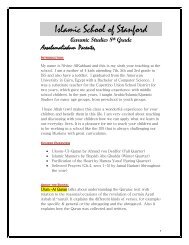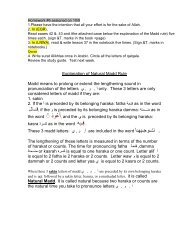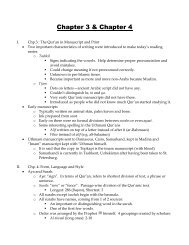Quranic Reflections - Islamic School of Stanford
Quranic Reflections - Islamic School of Stanford
Quranic Reflections - Islamic School of Stanford
Create successful ePaper yourself
Turn your PDF publications into a flip-book with our unique Google optimized e-Paper software.
- “And do not come near to adultery; surely it has been an obscenity<br />
and odious as a way"(TMQ, 17: 32).<br />
Since the ayahs address the pure nature, they describe zena (unlawful sex) as “odious<br />
as a way" for it is an extremely foul deed even if some <strong>of</strong> the weak souls do not find<br />
it so. Adopting such an evil way leads to nothing but destruction and disasters like<br />
murders, lack <strong>of</strong> rizq (sustenance), darkness <strong>of</strong> faces (the troubled state <strong>of</strong> mind that<br />
shows on the face), confusion <strong>of</strong> lineage, and a miserable sad life. Moreover, Allah<br />
(SWT) says what can be translated as,<br />
- “And do not kill the self that Allah has prohibited, except by truthful<br />
(right) (Literally: with the truth)” (TMQ, 17:33).<br />
- “And do not draw near the wealth <strong>of</strong> the orphan except in the fairest<br />
(manner)...” (TMQ, 17:34).<br />
- “And fill up the measure when you measure, and weigh with the<br />
straight equitableness... (TMQ, 17: 35).<br />
- “And do not pursue what you have no knowledge <strong>of</strong>; surely hearing and<br />
beholding and heart-sight, (Or: perception) all <strong>of</strong> those will be<br />
questioned <strong>of</strong>” (TMQ, 17:36).<br />
- “And do not walk in the earth merrily; surely you will never pierce the<br />
earth, and you will never reach the mountains in height” (TMQ, 17:33-<br />
37).<br />
Such words cannot possibly be rejected or deserted; the Book quite plainly orders<br />
Muslims to do all these good things and warns them against what may cause their<br />
destruction. Allah says (SWT) what can be translated as, “All the bad aspects <strong>of</strong><br />
these (the above mentioned things) are hateful to your Lord” (TMQ, 17:38).<br />
For this reason, these ayahs are followed by an interesting comment; Allah (SWT)<br />
says what can be translated as, “That is <strong>of</strong> (the) Wisdom your Lord has revealed to<br />
you...” (TMQ, 17:39). All the forth mentioned concepts constitute great wisdom and<br />
lead to a decent existence here and in the afterlife. Nevertheless, whoever disregards<br />
them is guaranteed a long stay in hell as Allah (SWT) says what can be translated as,<br />
“and do not make up with Allah another god, (or) then you will be cast in Hell<br />
blamed (and) rejected” (TMQ, 17:39). This illustrates the greatness <strong>of</strong> the Qur’an<br />
since in ayah after ayah, Allah (SWT) informs Muslims that all the good they could<br />
ever need is simply in it. Allah (SWT) says what can be translated as, “And indeed<br />
We have already propounded (i.e., Our warnings) in this Qur’an that they may<br />
constantly remember; and in no way does it increase them except in repulsion”<br />
(TMQ, 17:41).<br />
The value <strong>of</strong> the Qur'an<br />
Thus, the ayahs do not only establish the greatness <strong>of</strong> the Qur'an and the significance<br />
<strong>of</strong> its commandments, but also they enumerate the qualities <strong>of</strong> the Book from one



